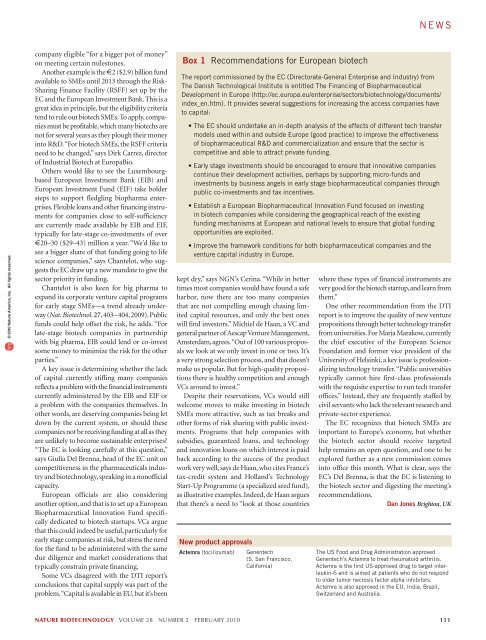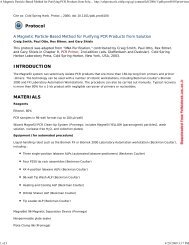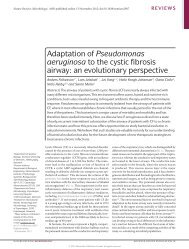NEWS© 2010 Nature America, Inc. All rights reserved.in briefPeruvian GM advocate facescriminal chargesErnesto Bustamante onPeruvian RPP radio.RPPA molecular biologistcould face a prisonsentence for criticizinga report on transgenicgene spread. ErnestoBustamante Donayre,vice president of thePeruvian Collegeof Biologists,a professionalorganization, standsaccused of defamation,a criminal offense,which in Peru can carry a prison term or fine.What triggered the suit was his public criticism ofa report prepared by Antonietta Ornella GutiérrezRosati, a biologist at the La Molina NationalAgricultural University in Lima, identifying a P34Spromoter and NK603 and BT11 transgenes in 14of 42 maize samples from the Barranca region.Gutiérrez sent summaries of her findings to boththe National Agricultural Research Institute andEl Comercio newspaper in 2007 calling for amoratorium on transgenic crops until biosafetyregulations are in place to prevent the spread tohuman food. Bustamante, a frequent contributorto radio and print, with no financial links to cropcompanies, described the alleged detection ofthree simultaneous transgenic events from twofirms as “absurdly improbable” in his newspapercolumn and called for her claims to be peerreviewed. “The main point of my criticism,”Bustamante says, “was her going to the pressinstead of to her peers.” After Bustamanterefused to retract his statements, Gutiérrezfiled a suit for defamation. She later presentedher findings to the Peruvian Genetic Society ofwhich she is president, but would not commenton the case, except to say that “you must userespect” in scientific discussion and that hercritics have “polarized” the debate. AlthoughPeruvian farmers already import transgenicproducts for animal feed, several interest groupsoppose their widespread introduction, which theylabel a foreign intrusion and threat to Peruvianbiodiversity. An ongoing investigation is seeking toreplicate Gutiérrez’s findings, but the governmentlacks the regulations to enforce its biosafety lawseven if it does find transgenic crop outcrossing.The criminal case, however, threatens to stifleall scientific discussion. “Regardless of whetherhe gets sentenced or not I don’t think anyone isgoing to criticize anything,” says plant scientistWayne Parrott, from the University of Georgia, aregular visitor to Peru. Bustamante’s colleagueand supporter Luis Destefano Beltrán of theCayetano Heredia Peruvian University agreesthat “many people have tried to avoid takingsides.” Peru retains criminal defamation laws,which the Inter-American Commission on HumanRights concluded in 1995 are incompatible withthe American Convention on Human Rights.Bustamante, who expects a ruling early thisyear, says, “The point is not whether I’m right orwrong. It’s the fact that for criticizing somebodyon scientific grounds I’m being tried in criminalcourt.”Lucas LaursenEC convenes crisis talks on Europeanbiotech sectorLast December, officials of the EuropeanCommission (EC), together with EmmanuelChantelot, executive director of the industrytrade association European BiopharmaceuticalEnterprises, convened a closed meeting to discussthe plight of the European biotech sector.Held at the EC headquarters in Brussels, themeeting was attended by policymakers, CEOsfrom small-to-medium-sized (SME) companies,national biotech associations, venturecapitalists (VCs) and big pharma representatives.The working group discussed the findingsof an EC-commissioned survey carried out bythe Danish Technological Institute (DTI) inTaastrup on the problems of access to financefaced by the biopharma industry. According tothis study, lack of access to capital is threateninginnovation and competitiveness in the sector,with 40% of companies facing extinction by theend of the year without a further cash injection.On the basis of the group’s discussions, severalpolicy recommendations were put forward withthe potential to increase sustainability of theEuropean sector (Box 1).The DTI’s findings portray European biotechas a rapidly deteriorating sector: 7% of theregion’s biotech SMEs need capital immediately,40% must raise capital within a year and nearly75% over the next 2 years. “Some SMEs are goingto go out of business, and many are stretchingresources and cutting back on programs” saysThomas Saylor, chair of the SME platform ofthe European Association for Bioindustries(EuropaBio). The data were gathered througha survey of 87 biopharma companies in Europethroughout May and June 2009, desk researchof reports and interviews with experts. The surveyis deemed to be representative of the stateof European biopharma, although there is anintentional bias toward smaller and youngercompanies, following the EC’s requested samplingcriterion.“The core of the problem is that there is lessventure capital money for small biotechs,” saysChantelot, and lack of cash creates fundinggaps in the chain from startup to initial publicoffering. The most severe gaps are at the early,high-risk stages, making it hard for fledglingcompanies to get off the ground or even stayafloat. The key reason for this gap in Europe,says Ivica Cerina, a partner at NGN Capital inHeidelberg, Germany, is pressure over the pastfive years to “de-risk,” pushing investors to focuson later stages and avoid risky startups. Privatesources of equity account, on average, for some60% of all SME funding.To address this problem, the DTI report recommendsincreasing public co-investments inmicro-fund and business angels to provide theseed money needed to get an SME rolling, whilesimultaneously creating tax incentives for doingso. As the former type of funding tends to operateon different timescales from venture funding,and with different skill sets and strategic views,several of the VCs at the meeting also pushedfor additional money. As such, Cerina wouldprefer to see more funds go into, or side-bysidewith, existing venture capital funds “eitheras dedicated early stage vehicles or directly intospecialized, early stage–savvy VCs”.Enhancing access to existing pools ofmoney could also support the recovery process,says Saylor, citing the European Union’s7 th Research Framework (FP7). “Funding hasbeen cumbersome to apply for, and for smallcompanies, in particular, it can be a hugeadministrative burden to take on the reportingrequirements under the framework,”Saylor says. He would also like to see followonfunding of the sort established by the UK’sTechnology Strategy Board, which makes aFlying the biotech flag. Policymakers, investorsand companies gathered at the Commission’sheadquarters in Brussels to discuss how toovercome funding shortages faced by Europeanbiotechs.AP Photo/Virginia Mayo110 volume 28 number 2 february 2010 nature biotechnology
news© 2010 Nature America, Inc. All rights reserved.company eligible “for a bigger pot of money”on meeting certain milestones.Another example is the €2 ($2.9) billion fundavailable to SMEs until 2013 through the Risk-Sharing Finance Facility (RSFF) set up by theEC and the European Investment Bank. This is agreat idea in principle, but the eligibility criteriatend to rule out biotech SMEs. To apply, companiesmust be profitable, which many biotechs arenot for several years as they plough their moneyinto R&D. “For biotech SMEs, the RSFF criterianeed to be changed,” says Dirk Carrez, directorof Industrial Biotech at EuropaBio.Others would like to see the LuxembourgbasedEuropean Investment Bank (EIB) andEuropean Investment Fund (EIF) take boldersteps to support fledgling biopharma enterprises.Flexible loans and other financing instrumentsfor companies close to self-sufficiencyare currently made available by EIB and EIF,typically for late-stage co-investments of over€20–30 ($29–43) million a year. “We’d like tosee a bigger share of that funding going to lifescience companies,” says Chantelot, who suggeststhe EC draw up a new mandate to give thesector priority in funding.Chantelot is also keen for big pharma toexpand its corporate venture capital programsfor early stage SMEs—a trend already underway(Nat. Biotechnol. 27, 403– 404, 2009). Publicfunds could help offset the risk, he adds. “Forlate-stage biotech companies in partnershipwith big pharma, EIB could lend or co-investsome money to minimize the risk for the otherparties.”A key issue is determining whether the lackof capital currently stifling many companiesreflects a problem with the financial instrumentscurrently administered by the EIB and EIF ora problem with the companies themselves. Inother words, are deserving companies being letdown by the current system, or should thesecompanies not be receiving funding at all as theyare unlikely to become sustainable enterprises?“The EC is looking carefully at this question,”says Giulia Del Brenna, head of the EC unit oncompetitiveness in the pharmaceuticals industryand biotechnology, speaking in a nonofficialcapacity.European officials are also consideringanother option, and that is to set up a EuropeanBiopharmaceutical Innovation Fund specificallydedicated to biotech startups. VCs arguethat this could indeed be useful, particularly forearly stage companies at risk, but stress the needfor the fund to be administered with the samedue diligence and market considerations thattypically constrain private financing.Some VCs disagreed with the DTI report’sconclusions that capital supply was part of theproblem. “Capital is available in EU, but it’s beenBox 1 Recommendations for European biotechThe report commissioned by the EC (Directorate-General Enterprise and Industry) fromThe Danish Technological Institute is entitled The Financing of BiopharmaceuticalDevelopment in Europe (http://ec.europa.eu/enterprise/sectors/biotechnology/documents/index_en.htm). It provides several suggestions for increasing the access companies haveto capital:• The EC should undertake an in-depth analysis of the effects of different tech transfermodels used within and outside Europe (good practice) to improve the effectivenessof biopharmaceutical R&D and commercialization and ensure that the sector iscompetitive and able to attract private funding.• Early stage investments should be encouraged to ensure that innovative companiescontinue their development activities, perhaps by supporting micro-funds andinvestments by business angels in early stage biopharmaceutical companies throughpublic co-investments and tax incentives.• Establish a European Biopharmaceutical Innovation Fund focused on investingin biotech companies while considering the geographical reach of the existingfunding mechanisms at European and national levels to ensure that global fundingopportunities are exploited.• Improve the framework conditions for both biopharmaceutical companies and theventure capital industry in Europe.kept dry,” says NGN’s Cerina. “While in bettertimes most companies would have found a safeharbor, now there are too many companiesthat are not compelling enough chasing limitedcapital resources, and only the best oneswill find investors.” Michiel de Haan, a VC andgeneral partner of Aescap Venture Management,Amsterdam, agrees. “Out of 100 various proposalswe look at we only invest in one or two. It’sa very strong selection process, and that doesn’tmake us popular. But for high-quality propositionsthere is healthy competition and enoughVCs around to invest.”Despite their reservations, VCs would stillwelcome moves to make investing in biotechSMEs more attractive, such as tax breaks andother forms of risk sharing with public investments.Programs that help companies withsubsidies, guaranteed loans, and technologyand innovation loans on which interest is paidback according to the success of the productwork very well, says de Haan, who cites France’stax-credit system and Holland’s TechnologyStart-Up Programme (a specialized seed fund),as illustrative examples. Indeed, de Haan arguesthat there’s a need to “look at those countriesNew product approvalsActemra (tocilizumab)Genentech(S. San Francisco,California)where these types of financial instruments arevery good for the biotech startup, and learn fromthem.”One other recommendation from the DTIreport is to improve the quality of new venturepropositions through better technology transferfrom universities. For Marja Marakow, currentlythe chief executive of the European ScienceFoundation and former vice president of theUniversity of Helsinki, a key issue is professionalizingtechnology transfer. “Public universitiestypically cannot hire first-class professionalswith the requisite expertise to run tech transferoffices.” Instead, they are frequently staffed bycivil servants who lack the relevant research andprivate-sector experience.The EC recognizes that biotech SMEs areimportant to Europe’s economy, but whetherthe biotech sector should receive targetedhelp remains an open question, and one to beexplored further as a new commission comesinto office this month. What is clear, says theEC’s Del Brenna, is that the EC is listening tothe biotech sector and digesting the meeting’srecommendations.Dan Jones Brighton, UKThe US Food and Drug Administration approvedGenentech’s Actemra to treat rheumatoid arthritis.Actemra is the first US-approved drug to target interleukin-6and is aimed at patients who do not respondto older tumor necrosis factor alpha inhibitors.Actemra is also approved in the EU, India, Brazil,Switzerland and Australia.nature biotechnology volume 28 number 2 february 2010 111
- Page 3 and 4: volume 28 number 2 february 2010COM
- Page 5 and 6: in this issue© 2010 Nature America
- Page 7 and 8: © 2010 Nature America, Inc. All ri
- Page 10 and 11: NEWS© 2010 Nature America, Inc. Al
- Page 12 and 13: NEWS© 2010 Nature America, Inc. Al
- Page 16 and 17: © 2010 Nature America, Inc. All ri
- Page 18 and 19: © 2010 Nature America, Inc. All ri
- Page 20 and 21: © 2010 Nature America, Inc. All ri
- Page 22 and 23: NEWS feature© 2010 Nature America,
- Page 24 and 25: uilding a businessComing to termsDa
- Page 26 and 27: uilding a business© 2010 Nature Am
- Page 28 and 29: correspondence© 2010 Nature Americ
- Page 30 and 31: correspondence© 2010 Nature Americ
- Page 32 and 33: correspondence© 2010 Nature Americ
- Page 34 and 35: correspondence© 2010 Nature Americ
- Page 36 and 37: case studyNever againcommentaryChri
- Page 38 and 39: COMMENTARY© 2010 Nature America, I
- Page 40 and 41: COMMENTARY© 2010 Nature America, I
- Page 42 and 43: patents© 2010 Nature America, Inc.
- Page 44 and 45: patents© 2010 Nature America, Inc.
- Page 46 and 47: news and viewsChIPs and regulatory
- Page 48 and 49: news and viewsFrom genomics to crop
- Page 50 and 51: news and views© 2010 Nature Americ
- Page 52 and 53: news and views© 2010 Nature Americ
- Page 54 and 55: e s o u r c eRational association o
- Page 56 and 57: e s o u r c e© 2010 Nature America
- Page 58 and 59: e s o u r c e© 2010 Nature America
- Page 60 and 61: e s o u r c e© 2010 Nature America
- Page 62 and 63: © 2010 Nature America, Inc. All ri
- Page 64 and 65:
B r i e f c o m m u n i c at i o n
- Page 66 and 67:
i e f c o m m u n i c at i o n sAUT
- Page 68 and 69:
lettersa1.5 kb hVPrIntron 112.5 kbA
- Page 70 and 71:
letters© 2010 Nature America, Inc.
- Page 72 and 73:
letters© 2010 Nature America, Inc.
- Page 74 and 75:
l e t t e r sReal-time imaging of h
- Page 76 and 77:
l e t t e r sFigure 2 Time-lapse li
- Page 78 and 79:
l e t t e r s© 2010 Nature America
- Page 80 and 81:
l e t t e r sRational design of cat
- Page 82 and 83:
l e t t e r s© 2010 Nature America
- Page 84 and 85:
l e t t e r s© 2010 Nature America
- Page 86 and 87:
sample fluorescence was measured as
- Page 88 and 89:
careers and recruitmentFourth quart
















